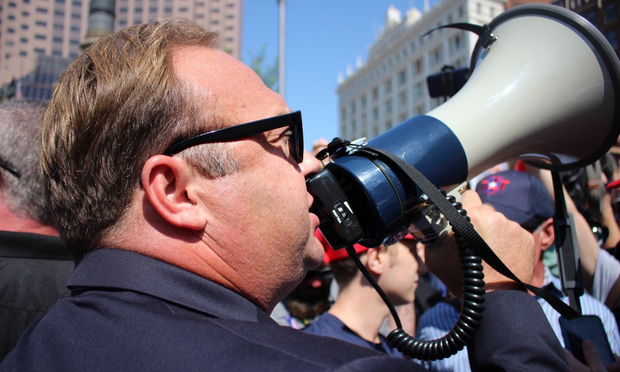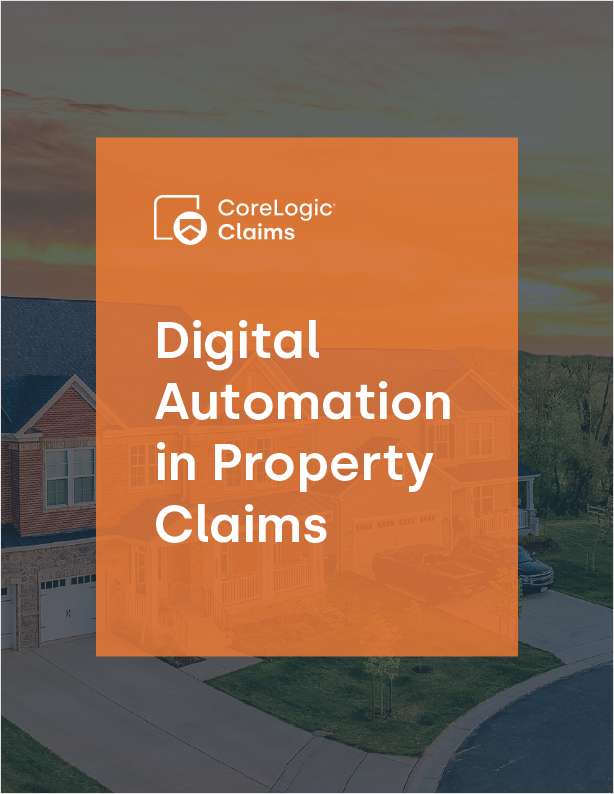Reaction to Barring Alex Jones From Social Media Sites: 'Be Careful of What You Ask For'
Connecticut legal experts differ on whether it was right for several social media platforms to ban or suspend right-wing radio host Alex Jones.
August 10, 2018 at 04:39 PM
5 minute read
 Alex Jones at the Republican National Convention in July 2016. Photo: Belltreephotography/Shutterstock
Alex Jones at the Republican National Convention in July 2016. Photo: Belltreephotography/Shutterstock
Less than one week after numerous social media platforms, including Facebook and Apple, either banned or suspended right-wing radio host and conspiracy theorist Alex Jones, Connecticut's legal community is divided on whether that was the right decision. Some also expressed concern that banning Jones could lead to a slippery slope for free speech.
All of those the Connecticut Law Tribune reached out to agree Jones, who among other things said the Sandy Hook Elementary School shooting was a hoax, has said abhorrent things. But they differ on what barring him from social media could mean.
Quinnipiac University law professor John Thomas said that, unlike the federal government, private companies are within their right to say who can use their social media platforms.
“It's interesting from a public policy perspective,” Thomas said Friday. “It is good, in my opinion. to deny this man a platform for his misrepresentations and hateful speech. From a legal standpoint, this would be problematic if the government was doing this because they'd be violating free speech. But private companies can do this. They are not limited by the Constitution, except to the extent statutes of law apply, which it does not in this case.”
Thomas, who said he is personally offended by Jones' comment on Sandy Hook and other topics, added: ”You are especially offended by him if you live in Connecticut. I am very empathetic to the [Sandy Hook] families, who have filed lawsuits against him. I believe they have a good claim for the damages that he has caused them.”
Sandy Hook made international headlines when shooter Adam Lanza killed 20 children and six educators with an AR-15 rifle at the elementary school in December 2012.
Thomas did say the slippery slope factor can always creep in. “I think it's a question of 'be careful of what you ask for,'” he said. “This could extend to other types of speech. Who is the arbiter of this? I guess the owners of social media are.”
Jamie Sullivan, managing partner of Hartford's Howard Kohn Sprague & FitzGerald, said he supports the decision by numerous social media outlets to ban or suspend Jones, host of the Texas-based “InfoWars.”
“From an ethical point of view, it's entirely appropriate,” said Sullivan, co-author of a book on legal ethics. “The type of speech they are prohibiting has no redeeming value. It's utterly false and deceitful and harmful.”
But longtime New Haven attorney Hugh Keefe disagrees with the decision by the private companies to discontinue their association with Jones.
“I don't think it's appropriate. I think free speech trumps being obnoxious,” said Keefe, a lawyer for more than 50 years who is a partner with Lynch, Traub, Keefe & Errante. “It's extremely valuable in this country to say what we want to say. We should be grown up enough to handle it. Yes, [Jones] is a complete wacko, but he is not the first complete wacko to have his stuff printed.”
Keefe added: “This is a lessening of our First Amendment rights.”
In addition to Facebook and Apple, those banning, suspending or removing Jones' content from their platforms include YouTube, Spotify, LinkedIn, Mailchimp, Pinterest and Stitcher. The social media sites all said that Jones violated their policy on hate speech.
Twitter is the only notable social media platform not to act against Jones. Twitter Chief Executive Office Jack Dorsey said in a tweet earlier this week: “We know that it's hard for many but the reason [for not banning him] is simple: He hasn't violated our rules. We'll enforce if he does. And, we'll continue to promote a healthy conversational environment by ensuring tweets aren't artificially amplified.”
Several Sandy Hook families whose loved ones were killed in the massacre have filed defamation lawsuits against Jones. While Jones has since said he believes people did die at Sandy Hook, he was on record soon after the shootings, referring to the massacre as a “hoax” and “fake.”
One of the lawsuits describes Jones as a “conspiracy theorist radio and Internet personality who holds himself out as a journalist.” It says he is “the most prolific among those fabricators.” It also calls Jones “the chief amplifier for a group that has worked in concert to create and propagate loathsome, false narratives.”
Koskoff Koskoff & Bieder, the law firm for the families in one of the lawsuits, issued a statement soon after the social media outlets banned or suspended Jones. “News outlets and social media platforms are finally waking up to the critical difference between those who foster a marketplace of freely exchanged ideas, and those that peddle false facts to make money off of the suffering of others. Unfortunately, for many of the Sandy Hook families, the damage has already been done,” the statement said. The family attorneys declined to comment on Twitter's decision to allow Jones on its platform.
The Connecticut Law Tribune reached out via email to both Twitter's communications team and Jones' radio show. Neither responded to a request for comment Friday.
Related Stories:
Alex Jones Cites Freedom of the Press as Reason to Dismiss Sandy Hook Defamation Suits Against Him
New Suit Filed Against Sandy Hook Conspiracy Theorist, InfoWars Host Alex Jones
This content has been archived. It is available through our partners, LexisNexis® and Bloomberg Law.
To view this content, please continue to their sites.
Not a Lexis Subscriber?
Subscribe Now
Not a Bloomberg Law Subscriber?
Subscribe Now
NOT FOR REPRINT
© 2025 ALM Global, LLC, All Rights Reserved. Request academic re-use from www.copyright.com. All other uses, submit a request to [email protected]. For more information visit Asset & Logo Licensing.
You Might Like
View All
Trump's DOJ Delays Releasing Jan. 6 FBI Agents List Under Consent Order
3 minute read
Judge Grills DOJ on Trump’s Birthright Citizenship Executive Order

Justice 'Weaponization Working Group' Will Examine Officials Who Investigated Trump, US AG Bondi Says

Trending Stories
Who Got The Work
J. Brugh Lower of Gibbons has entered an appearance for industrial equipment supplier Devco Corporation in a pending trademark infringement lawsuit. The suit, accusing the defendant of selling knock-off Graco products, was filed Dec. 18 in New Jersey District Court by Rivkin Radler on behalf of Graco Inc. and Graco Minnesota. The case, assigned to U.S. District Judge Zahid N. Quraishi, is 3:24-cv-11294, Graco Inc. et al v. Devco Corporation.
Who Got The Work
Rebecca Maller-Stein and Kent A. Yalowitz of Arnold & Porter Kaye Scholer have entered their appearances for Hanaco Venture Capital and its executives, Lior Prosor and David Frankel, in a pending securities lawsuit. The action, filed on Dec. 24 in New York Southern District Court by Zell, Aron & Co. on behalf of Goldeneye Advisors, accuses the defendants of negligently and fraudulently managing the plaintiff's $1 million investment. The case, assigned to U.S. District Judge Vernon S. Broderick, is 1:24-cv-09918, Goldeneye Advisors, LLC v. Hanaco Venture Capital, Ltd. et al.
Who Got The Work
Attorneys from A&O Shearman has stepped in as defense counsel for Toronto-Dominion Bank and other defendants in a pending securities class action. The suit, filed Dec. 11 in New York Southern District Court by Bleichmar Fonti & Auld, accuses the defendants of concealing the bank's 'pervasive' deficiencies in regards to its compliance with the Bank Secrecy Act and the quality of its anti-money laundering controls. The case, assigned to U.S. District Judge Arun Subramanian, is 1:24-cv-09445, Gonzalez v. The Toronto-Dominion Bank et al.
Who Got The Work
Crown Castle International, a Pennsylvania company providing shared communications infrastructure, has turned to Luke D. Wolf of Gordon Rees Scully Mansukhani to fend off a pending breach-of-contract lawsuit. The court action, filed Nov. 25 in Michigan Eastern District Court by Hooper Hathaway PC on behalf of The Town Residences LLC, accuses Crown Castle of failing to transfer approximately $30,000 in utility payments from T-Mobile in breach of a roof-top lease and assignment agreement. The case, assigned to U.S. District Judge Susan K. Declercq, is 2:24-cv-13131, The Town Residences LLC v. T-Mobile US, Inc. et al.
Who Got The Work
Wilfred P. Coronato and Daniel M. Schwartz of McCarter & English have stepped in as defense counsel to Electrolux Home Products Inc. in a pending product liability lawsuit. The court action, filed Nov. 26 in New York Eastern District Court by Poulos Lopiccolo PC and Nagel Rice LLP on behalf of David Stern, alleges that the defendant's refrigerators’ drawers and shelving repeatedly break and fall apart within months after purchase. The case, assigned to U.S. District Judge Joan M. Azrack, is 2:24-cv-08204, Stern v. Electrolux Home Products, Inc.
Featured Firms
Law Offices of Gary Martin Hays & Associates, P.C.
(470) 294-1674
Law Offices of Mark E. Salomone
(857) 444-6468
Smith & Hassler
(713) 739-1250










